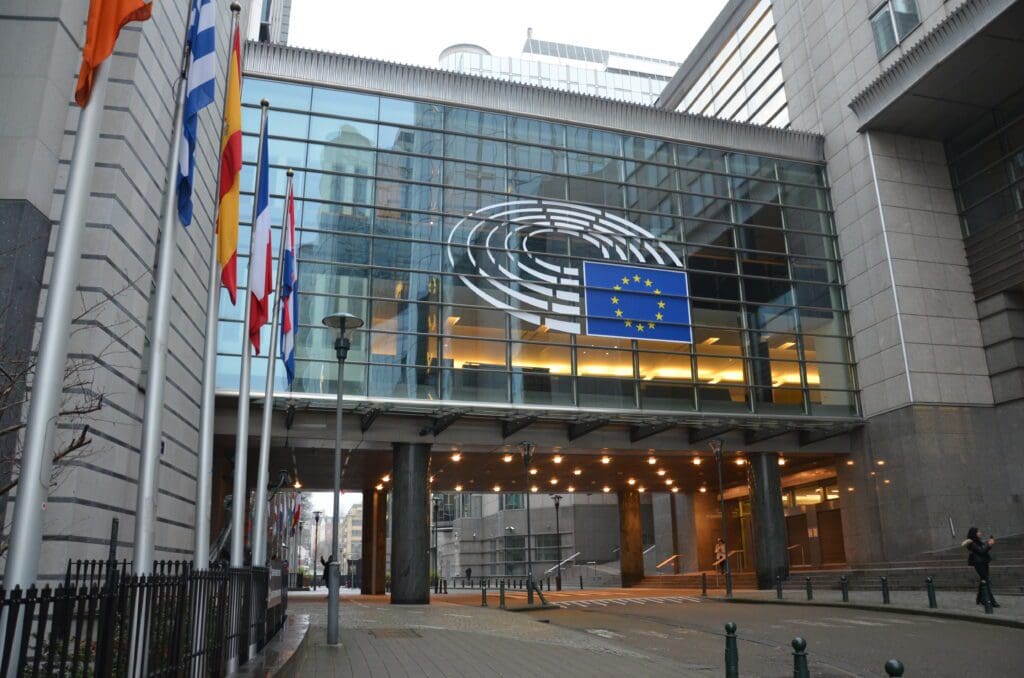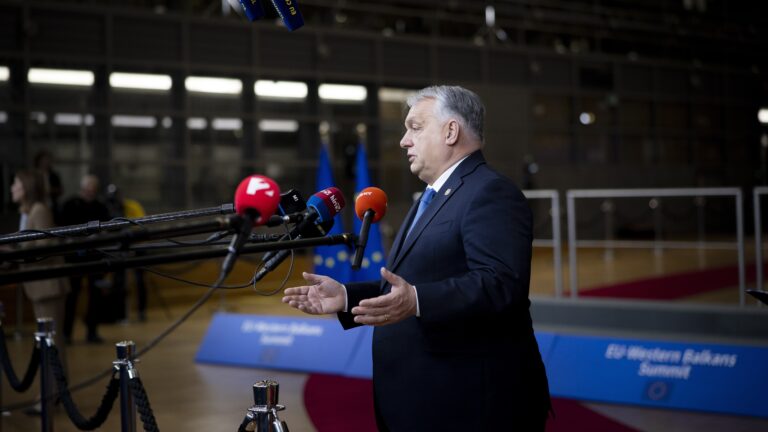The President of the European Commission, Ursula von der Leyen, is on fire lately. She relentlessly pushes the disastrous sanction policies, disregards the series of protests heating up all over Europe, and even continues to blackmail Hungary over non-compliance with certain ‘democratic’ EU norms, while she herself is implicated in one of the EU’s biggest corruption scandals ever. The European Union’s moral and ideological posturing is nothing new, of course. Countries with conservative governments are all used to being told from time to time that they got the whole democracy thing somehow wrong. Nonetheless, Von der Leyen’s most recent stunt goes further than anything before and is absolutely unacceptable from someone who is supposed to be a champion of human rights. Trying to steer voters ‘in the right direction’ with explicit petty threats just two days ahead of a national election is unprecedented.
That’s right. Ursula von der Leyen, the President of the European Commission, and therefore the head of the EU, dared to issue a threat should the outcome of a democratic election in a sovereign Member State be not to her liking. According to Euronews, at a Q&A session after her speech at Princeton University, Von der Leyen said the following, referring to the parliamentary election that will be held on Sunday in Italy: ‘We’ll see the outcome of the elections. We just had elections in Sweden, too. My approach is that whatever democratic government is willing to work with us, we’re working together. […] We will see the result of the vote in Italy. If things go in a difficult direction, we have tools – I’ve spoken about Hungary and Poland.’
Von der Leyen threatens the Italians: "We will see the result of the vote in Italy. If things go in a difficult direction, we have tools, as in the case of Poland and Hungary." A desperate attempt to influence the vote in Italy that runs towards the far right. Game over Ursula! pic.twitter.com/MhkaiQus9x
— RadioGenova (@RadioGenova) September 23, 2022
There is a lot to unpack here, both explicit and subtle meanings of her words. First, while the rule-of-law mechanism was only triggered in relation to Hungary so far, Von der Leyen’s last sentence makes it clear that Poland is next in line if it wouldn’t change its ways. In fact, after years of threatening, I’m fairly certain that Warsaw was only let off the hook for the time being because of its pivotal role in handling the Ukrainian refugee crisis, doing more than any other country in Europe. But as soon as the war eases up a bit, Poland’s right-wing government will be the first to fall victim to the EU’s new ideological sanctions.
Similarly, her words suggest that Sweden might find itself in the same shoes once the structure of its new conservative government crystallises in the coming months. With 20.5 per cent of the votes, the sovereigntist Sweden Democrats, labelled far-right or outright neo-Nazi by the European left, became the victorious right-wing bloc’s biggest party. The opportunity to form a government was given to the centre-right Moderate Party (albeit it only obtained a 19.1 per cent in the election), and it is still a question whether the governing coalition will include SD. But it it will, I believe that would constitute a ‘difficult direction’ in the eyes of von der Leyen, unilaterally jeopardising the future cooperation between Brussels and Stockholm.
The word ‘democracy’ has one particular meaning in the EU’s vocabulary
At least, these remarks came after the elections in Sweden. What these ‘veiled warnings’ (as Reuters so subtly put it) imply in relation to Italy is a whole different level. Of course, she said the European Commission was ready to work with whatever democratic government would hail from the results, but we know all too well well that the word ‘democracy’ has one particular meaning in the EU’s vocabulary. Democracy is whatever they say it is, and usually it is intertwined with a leftist understanding of human rights, fundamental freedoms and national values. Therefore, what von der Leyen basically said is that if the new Italian government turns out to be conservative, and has the audacity to take up a position on migration, family policies or LGBTQI issues that goes against that of the European Commission—the ‘guardian of the EU treaties’—the Commission will have no other option than to trigger the rule of law mechanism, and freeze billions of cohesion funds. In the middle of the European Union’s greatest economic and energy crisis and at the brink of a potential war with a nuclear power. Not the wisest move, if you ask me.
We can also be certain that the EC president would not have thrown around such threats if she didn’t think it was necessary. In fact, according to the latest polls (published on 9 September), the national-conservative Fratelli d’Italia (Brothers of Italy) is set to win this Sunday with more than 25 per cent, while the social-democratic PD, favoured by the EU, was measured at only 22 per cent. Of course, a quarter of the votes will not be enough to form a government, but there are several like-minded parties for the FdI to pick coalition partners from. Besides, I would humbly add, if the largest party in a country (and in fact, in several countries) is among those you deem ‘far-right extremist’, than perhaps it is your perception that’s wrong, and not that of the tens of millions of people who vote for them.
The remarks understandably angered many on the Italian political scene. Matteo Salvini, for example, whose Lega party was polled fourth with 13 per cent and which could be a valuable ally to FdI in forming a government, called von der Leyen’s remarks ‘shameful arrogance’, and asked the EC president to ‘respect the free, democratic and sovereign vote of the Italian people.’ Salvini later even added that the president should ‘apologise, or she should resign.’
Regardless of whether the EC will eventually act upon these threats or not, the remarks constitute a new low for Ursula von der Leyen and for the whole European Commission. Whatever she hoped to achieve by making them, they could easily yield quite the opposite result. The core problem of the EC with national-conservative parties is that they tend to be sovereigntists, and that is a direction that directly challenges the European Union’s ‘deepening integration’ goals. Threats like these will most certainly not convince any country to give up even more of its sovereign powers on behalf of the Commission—quite the contrary. If the EC continues to disregard the will of the European people, disrespect democratically elected governments and to threaten or blackmail them by withholding essential funds, we can expect that more and more people will wonder whether Maastricht was a good idea to begin with. It is no accident that the famous saying ‘When in Rome, do as the Romans do’ does not go like ‘When in Rome, just threaten them, and they’ll do what you want.’ Democracy is about the will of the many, and not of the few. It is high time the European Commission understood it.
Editor’s Note: Commenting on von der Leyen’s remarks, Eric Mamer, spokesman for the European Commission, told reporters in Brussels on Friday that von der Leyen had not been referring to the Italian election. ‘She was stressing the role of the Commission as guardian of the treaties with regard to the rule of law,’ Mamer claimed.







